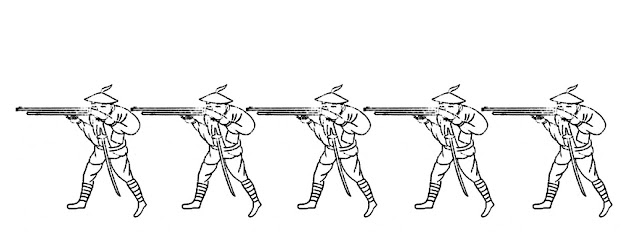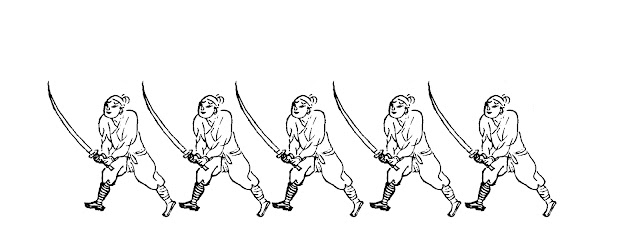 |
| Heavily armoured Sha Shou Dui, from 'Lian Bing Za Ji (《練兵雜紀》)'. |
Even after the conception of new Mandarin Duck Formation and the formation of Bu Ying (步營), Qi Ji Guang (戚繼光) was still unsatisfied with the performance of the garrison troops of Northern frontiers. He requested for the transfer of Southern troops from Zhejiang province — troops he raised, trained personally, and fought together with — to Northern frontier almost as soon as he took charge in Ji Garrison. The request was granted. At first three thousand Southern troops were sent, but this number gradually expanded to about twenty thousand.
Reorganisation of Bu Ying
With the transfer complete, Qi Ji Guang now had access to equipment from both Northern and Southern China. He proceeded to reorganise Bu Ying and modify the Mandarin Duck Formation (again) to better utilise the combined strength of both Northern and Southern troops. With the influx of more advanced firearms (i.e. arquebus) from South China, Qi Ji Guang was finally able to create an independent firearm division within Bu Ying.
Sha Shou Dui (殺手隊, lit. 'Killing hands squad' or 'Killer squad')
 |
| Rendition of a five-man team forming one half of the Sha Shou Dui. This image is cropped, edited, and pieced together from the training manuals found in 'Ji Xiao Xin Shu (《紀效新書》)'. |
Qi Ji Guang retained the dual role function of Sha Shou Dui, but removed all guns from the squad. Troops previously armed with guns all switched to bows and arrows instead. When switched to ranged weapons, Sha Shou Dui deployed in a single rank and provided supporting fire in between arquebus volleys.
Huo Qi Dui (火器隊, firearm squad)
 |
| Five arquebusiers forming one half of the Huo Qi Dui. This image is cropped, edited, and pieced together from 'Shen Qi Pu (《神器譜》)'. |
 |
| Five arquebusiers forming one half of the Huo Qi Dui, now switched to their melee weapons. This image is cropped and pieced together from the training manuals found in 'Ji Xiao Xin Shu (《紀效新書》)'. |
While large, two-handed sword might seems like an odd weapon choice, especially for ranged troops, it was in fact uniquely suited for arquebusiers for several reasons. Firstly, arquebusiers generally fought in looser formation than densely packed pikemen, which means they had plenty of space to swing around their large swords. Secondly, arquebus was easier to master, thus arquebusiers could spend more time training in swordsmanship. Thirdly, arquebus was less tiring to use, unlike a bow or a crossbow, which means an arquebusier could preserve enough stamina to use his sword effectively even after long period of shooting. Finally, unlike heavy polearms such as halberd or Zhan Ma Dao (斬馬刀), a two-handed sword could be sheathed inside a scabbard and carried on the back (or waist), thus it would not hinder the arquebusier when he was firing or reloading his gun.
Combined Strength
Qi Ji Guang maintained a 1:1 ratio of Sha Shou Dui to Huo Qi Dui, which was exceptionally high for a Ming army. Unlike contemporary European armies, Bu Ying had no distinct "pike" and "shot" elements. Entire Bu Ying was expected to engage in ranged combat as well as close combat. For the same number of troops, a Bu Ying could squeeze out more than double the shots (as arrows and rockets had higher rate of fire) than a pike-and-short army, and commit double the manpower into close combat, without being any less effective in either role.
Other blog posts in my Mandarin Duck Formation series:
Mi Zhan — the original Yuan Yang Zhen
Qi Ji Guang's Yuan Yang Zhen — Part 1
Qi Ji Guang's Yuan Yang Zhen — Part 2
Qi Ji Guang's Yuan Yang Zhen — Part 3
Qi Ji Guang's Yuan Yang Zhen — Part 4
Qi Ji Guang's Yuan Yang Zhen — Part 5
Qi Ji Guang's Yuan Yang Zhen — Part 6
Xu Guang Qi's Yuan Yang Wu
https://www.youtube.com/watch?v=rd9FMGG9Mp0
ReplyDeleteDocumentary on Qi Jiguang's Mandarin Duck formation fyi. In case haven't seen before
Yes, I've seen it. Both (Chinese documentary & Koran demonstration) have their share of inaccuracies (i.e when the formation fan out to thrust, trident troops should not come to the front row), but I like the Chinese one more.
DeleteBy the way, I do like the point about Lang Xian preventing the swordsman from executing a (what I presume to be) hanging parry though.
Delete